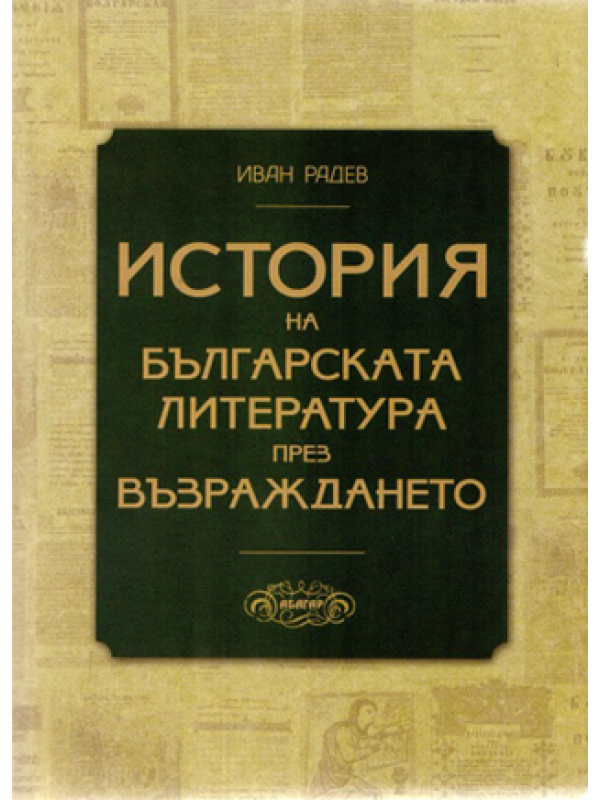Shopping Cart
0 item(s) - 0.00лв
A History of the Bulgarian Literature in the Period of National Revival
A History of the Bulgarian Literature in the Period of National Revival. Second revised edition. In Bulgarian
Table of cotents
About the “Histories” of literature and this “History” in particular
General issues
The literature in the period of National revival — division into periods
A brief review of the state of literary life in the 16th—18th century
Tardiness of the Renaissance process in our country
The National revival and its international context
Alternatives for the civilizer's model
Similarities and differences from the West-Europeans
Renaissance and Enlightenment. Literary influences
National-specific aspects of the revival
Changes in the collective sensitivity
Building-up of adequate social milieu
Personal evolution and general aesthetic development
Mythology and the National revival.
Typology and adaptivity
Political myths (“Ilirik”, “Elada”, “Piemont”, ”Grandpa Ivan”)
Mythologems of the “applied” type (“The Highwayman Who Became a Monk”, “The LameTeacher”, “Dionisii, the Cossack”...)
II. Towards national awakening
Paisii Hilendarski
National-specific, fictional and publicist aspects of “A History of the Slav-Bulgarians”
Levels of compatibility with other texts
Movement towards an elaboration of chronicle writing
A look into the past
Christo Zhefarovich. “Stematography...”
Spiridon Gabrovski. “A History in Brief...”
Atanas Neskovich. “A History of the Slav-Bulgarian People”
III. Towards a cultural and educational advancement
Sophronh Vrachanski. The essence of his work and its historic significance.
“Nedelnik (Collection of holiday sermons)”
A collection of “Short Stories and Reflections”
“The Life and Martyrdom...”
The “Sophronians” in the period of National Revival: loakim Kurchovski, Kiril Peichinovich and others
The experience of others and levels of its adaptivity
Dr. Nikola Pikolo
Dr. Peter Beron
The enlighteners and the transition towards adequate aesthetic thinking
Konstantin Ognianovich
Christodul Sichan-Nikolov
Ivan Bogorov
lordan Kostadinov-Ginot
Theses on the nature of the literature of the enlightenment
The original publicist forms
Approaches to verse
The book of collections as a literary form; aesthetic potential of prepersonalism
The first stage of narrative thinking
Paratexlual aspects of expression and dialogue with the reader
IV. Towards aesthetic thoroughness and genre syntheses of literature in the period between the 40s—80s
Aspects of the cultural situation.
Folklore and personal poetry, the manuscripts of song collections as a form of literary life
Aesthetic awareness and mythology. Myths of the poeticized patriotic idea (“Mother Bulgaria”, “The Lion of the Balkans”, The one who will live... eternally in the Balkan”)
Departing points for personal sanctification (Levski, Botev...)
Anonymity and authorship — the status of the creator
Periodicals and fiction
The nature and development of poetry as a form of art
Naiden Gerov
Dobri Chintulov
Petko Slaveikov
Directions and type of presence in the literary process
Intimate and political verse
“The Spring of Belonogata (the White-legged)” — the folklore basis and the author's viewpoint
Slaveikov's prose
Georgi Rakovski
The experience of others and levels of its adaptivity
Grigor Purlichev
Dimitar Veliksin
Raiko Zhinzifov
Approaches to drama
The “phenomenon” Dobri Voinikov
“Ivanko” by V. Drumev
“Hadgi Dimitar lassenov” by L. Karavelov
Dramaturgic renditions of prose writings
The fiction of the 60s and 70s — the second stage of narrative writing
Vassil Drumev
“The Unhappy Family”, prose as a form of art
“Student and Benefactors” — genre and style
Ilia Blaskov (“Lost Stanka”, “Miserable Kruslinka”)
Ljuben Karavelov
Karavelov's prose at the beginning of the 60s
Variations of the short story — from “Voivoda” (Chieftain) to “Crying Crocodile tears on someone else's grave”. The poetics of composition
The problems of the genre
Characters and aesthetic representation of the national style of living...
Towards exhaustive representation of everyday and social life
“Bulgarians of old Times”, “Mummy's Boy”
“The alien” and the social meaning of generalizations (“Is Fate To Blame “Hadgi Nicho”, “An Exceptional Patriot”)
The beginnings of the historical novel: The trilogy “Reveng”, “After the revenge”, “This is the end”
Christo Botev
Poetry
The romantic vein — an analogue of the optimism of the National Revival (“At Parting”, ”Haidouks”, “Elopement”)
Personal and biblical verse — analogies and points of divergence (“Elegy”, “Struggle”, “My Prayer”, “Vassil Levski's Hanging”)
“Songs and Verses by Botev and Stambolov” — the nature and role of this collections in the poetry of the 70s
Prose
From article-writing to the philosophy of everyday life (“Examples of Turkish Justice”, “The People Yesterday, Today and Tomorrow”, “Petrushan”)...
The Bible and Botev's publicist writings
Conclusions
The literature of the national revival
“Missing texts” — reconstruct status, and volume from a receptive point of view
The problem of completeness/incompleteness of a work of fiction
Historiography of the literature of the National revival
Formation and status of literary criticism in the period of National revival
Stages and methods of historical and literary thinking
Suggestions for further reading
Bibliography
| Details | |
| Publisher | Abagar |
| Language | Bulgarian |
| Pages | 616 |
| Illustrations | – |
| Binding | paperback |
| ISBN | 978-9-54427-963-9 |
| Creation date | 2012 |
| Size | 16 х 24 cm |
Write a review
Your Name:Your Review: Note: HTML is not translated!
Rating: Bad Good
Enter the code in the box below:











